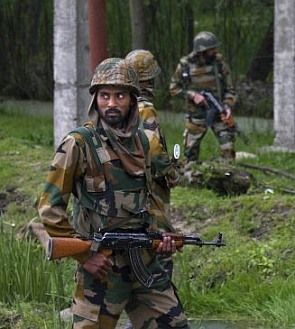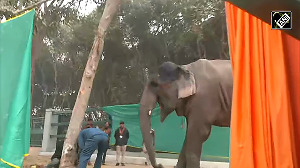 'The provisions of the AFSPA must remain on the statute books given the increasingly violent and uncertain times,' says Nitin Gokhale.
'The provisions of the AFSPA must remain on the statute books given the increasingly violent and uncertain times,' says Nitin Gokhale.
With the PDP-BJP alliance in Jammu and Kashmir now a reality, attention will be focused on how the two parties have overcome their diametrically opposite views on two sensitive issues -- Article 370 and the imposition of the much-misunderstood Armed Forces (Special Powers) Act, 1958.
The common minimum programme between the two parties or the agenda for governance as it is being described is likely to spell out the details. It is important to revisit the provisions of the controversial Act and the circumstances under which it is sought to be imposed.
Going beyond the immediate however, a closer look is needed at the AFSPA and the circumstances under which it has come to acquire such negative connotations.
Discussions on the law, however, gets clouded by emotions, distrust and even lack of understanding about the circumstances under which it is applied.
Remember, the AFSPA, when promulgated in 1958 to empower the army combat the then nascent Naga insurgency, was meant to be an 'emergency' law.
Unfortunately, in the all-round mishandling of the aspirations in the North-East and the multitudinous rebellions it spawned in the region, the AFSPA -- and not the all-round failure of the Indian State -- has been demonised.
Instead of being used in short spurts, the AFSPA has been allowed to be applied continuously for 57 years. Who is responsible for this state of affairs? Not the army, surely.
After all, it is deployed after the police and other agencies fail. And after certain districts or the entire state is brought under the Disturbed Areas Act, DAA.
In fact, without the promulgation of DAA, the AFSPA is not applicable. The DAA is promulgated on the advice of the state government. So who is to be blamed for the demonisation of the AFSPA? It must squarely lie with the political executive.
Take the case of Assam. For the past decade at least, the Tarun Gogoi government could have let the police and the central police forces handle the remnants of insurgency still active in some parts of the state. But Chief Minister Gogoi has repeatedly resisted any move to drastically reduce or even end the army's counter-insurgency role.
And if the army has to operate in an internal security scenario, it needs the protective umbrella of the AFSPA just as the police operate under the Indian Penal Code and the Criminal Procedure Code.
The mere fact that the provisions of the AFSPA have to be invoked in a particular area ex facie establishes that handling the law and order situation had gone beyond the control of the state government.
Army personnel, operating in those circumstances, need to enjoy at least similar powers as the police force, if not wider ones. So, just as Section 45 of the CrPC disallows arrest of public servants (read police and CPAF personnel in this context) and just as Section 197 provides impunity against prosecution, Section 7 of the AFSPA gives similar protection to the army personnel.
Nothing more, nothing less.
And yet, most opponents of the AFSPA have chosen to either downplay or completely ignore this similarity.
In the case of Jammu and Kashmir, the army needs legal protection all the more since applicability of CrPC is disallowed in the state that operates under a different set of laws called the Ranbir Penal Code.
The circumstances too are different than those in the North-East.
When the AFSPA was made applicable in Jammu and Kashmir in 1990, India was fighting a proxy war fueled by an implacable adversary. In the past 25 years, the country's collective efforts have brought down all known parameters of violence down to manageable levels with the help of the Indian Army.
For a quarter century, the army was the only functioning government agency in most parts of Kashmir. It is certainly time for the army to step back a little in Jammu and Kashmir and allow the civil administration to start playing its part in providing good governance.
The army has sound reasons to resist withdrawal of the AFSPA. For instance, it says lifting of the AFSPA from urban areas/large towns in Jammu and Kashmir will result in terrorists seeking shelter in such areas and rebuilding their bases, as has been witnessed in Manipur's capital Imphal, post-2004.
Moreover, all lines of communication in Jammu and Kashmir pass through population centres and have to be kept open at all cost. The army garrison/strategic assets are spread over in population centres and de-notification will render them vulnerable to terrorist action and hence require separate security arrangements.
Any action taken by the army personnel in these areas will be governed by the Ranbir Penal Code which does not confer immunity from arrest and complicate the issue.
The revocation of the AFSPA from any area needs a concerted view of all organs of the state and Centre. A suggested way is to convert these areas into police administered areas/police districts as was done for Srinagar initially without revoking AFSPA.
Subsequently, as the situation improves, while evolving the revocation, an exit strategy needs to be worked for gradual withdrawal of the armed forces from the specified area leading to smooth transition.
Lifting the AFSPA can certainly be attempted, but the provisions of the AFSPA, as an emergency law that empowers the army -- the nation's instrument of last resort -- must, however, continue to remain on the statute books given the increasingly violent and uncertain times that the sub-continent is likely to face in coming years.
When needed, it must be applied in small doses. Every country has to balance the need for a stringent law with the basic principles of ensuring human dignity and human rights. Therein lies the challenge for India's -- and Jammu and Kashmir's -- leadership.
REDIFF RECOMMENDS











 © 2025
© 2025